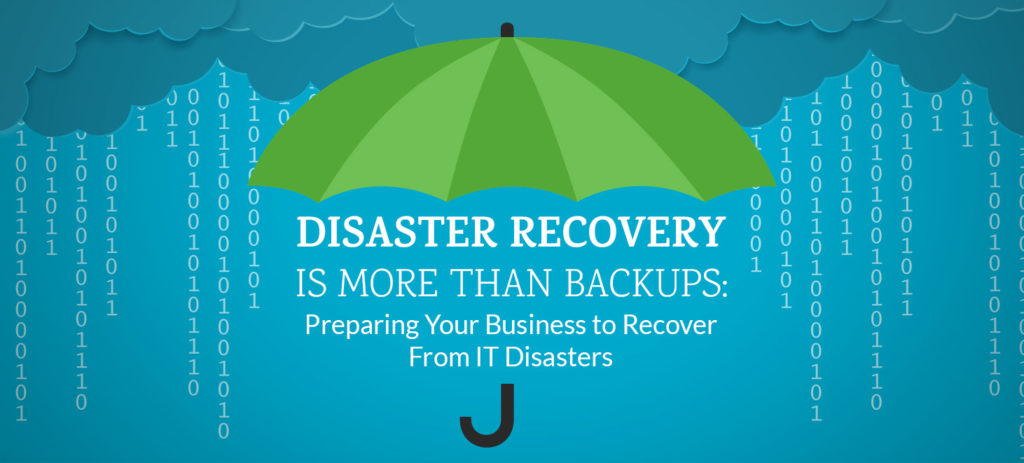
Disaster Recovery is More Than Backups: Preparing Your Business to Recover From IT Disasters
15 years ago when I was just starting out my career in IT, we still largely lived in a world of paper. Sure, the Internet was becoming more commonplace and desktops were cropping up in offices everywhere – but it was still a “hard copy” era all the same.
Fortunately or unfortunately, we don’t live in that world of paper any longer.
On paper, IT should be something you never have to think about – it just “works” and you never even realize it’s there. But IT is nothing if not inherently fragile – meaning that unfortunately, Murphy’s Law still rules the day. This is a conversation that I was having with one of our clients on the phone just the other day, as we were discussing steps that I had hoped to take to improve both the stability and the reliability of their infrastructure moving forward.
“Crystal, why are we still talking about this?” he said to me. “No offense, but we already handled disaster recovery. Our backups are taken care of, you said it yourself. What else is there to worry about?”
Sadly, the answer to that question is clear: “quite a lot.”
The reason I’m writing this article today is because that client’s mentality is one that a lot of people share. They see their backups not as a means to an end, but as “the end” in and of itself. However, this fails to see the forest for the trees. Your backups are NOT your disaster recovery plan. They are instead just one part of a much larger idea.
Now, I’d like to talk about why that’s the case – and what it means for your critical business operations moving forward.
The Trouble With an Over-Reliance on Backups
When we have clients at AdvanTech who go through audits of their disaster recovery plan as part of larger compliance requirements, oftentimes they don’t realize that having a backup system in place does not constitute an actual recovery plan. This is especially true when it’s their first time preparing for such an audit.
To be clear, this is nobody’s fault. We (rightfully) put so much of an emphasis on backing up anything and everything that they often take on the idea that backups are a silver bullet. No matter what problem you have, no matter how severe the situation you face, so long as you have backups you’re okay.
Well… yes and no.
That’s like saying the only thing you need to have a fully functioning car is an engine. Sure, it’s important – but so are the wheels, the transmission and the alternator.
A solid disaster recovery plan is all about making sure you have access to the information you need to make fast, smart and informed decisions in a high stakes scenario. It will answer questions like:
- How are you actually going to get things back up and running? You’re going to recover from your backups, sure… but how? Where? When?
- If the disaster you’re experiencing compromised your physical place of business, where does the recovery happen? Are you renting a new office? Are you moving into something temporary, like a trailer?
- Say your entire business burns to the ground – what do you actually restore those backups to?
This is why an actual disaster recovery plan is needed – because you have to be able to account for the huge number of different variables that are now a part of your life.
If your entire business burns to the ground, that’s a very different situation compared to one where your entire infrastructure gets hit with a ransomware attack. Both recovery processes are going to involve those same backups. But the people involved, what they need to do, when they need to do it and so many other factors are going to be completely and totally different.
At any given moment, you need to know how you are going to get those backups working and get your people back to work in a time when every second is critical. That plan needs to be communicated to everyone around you so that they know what is expected of them, too.
These are the types of things you need to start thinking about not tomorrow, not next week, but today. Never forget that “Murphy’s Law” doesn’t care about your backups. It doesn’t care about anything, in fact – which means that whether you like it or not, you’re going to have to pick up the slack.
Preparing Today for the Disasters of Tomorrow
At this point, I suggest you contact either myself or one of my colleagues at AdvanTech so that we can make sure we’re a good fit for one another. That way, we’ll put ourselves in the best possible position to help you get started.
Preparing Today for the Disasters of Tomorrow

If you're ready to come up with the right, organic and actionable disaster recovery strategy for your business, terrific - we're ready to do that, too. Contact us so that we can make sure we're a good fit for one another.


Crystal is the COO and President of Advantech IT, a Fall River IT support company that has been helping small businesses by providing an innovative and unique blend of managed IT services in all of Rhode Island, Massachusetts and certain parts of Connecticut. Learn more about Crystal and Advantech IT here.

